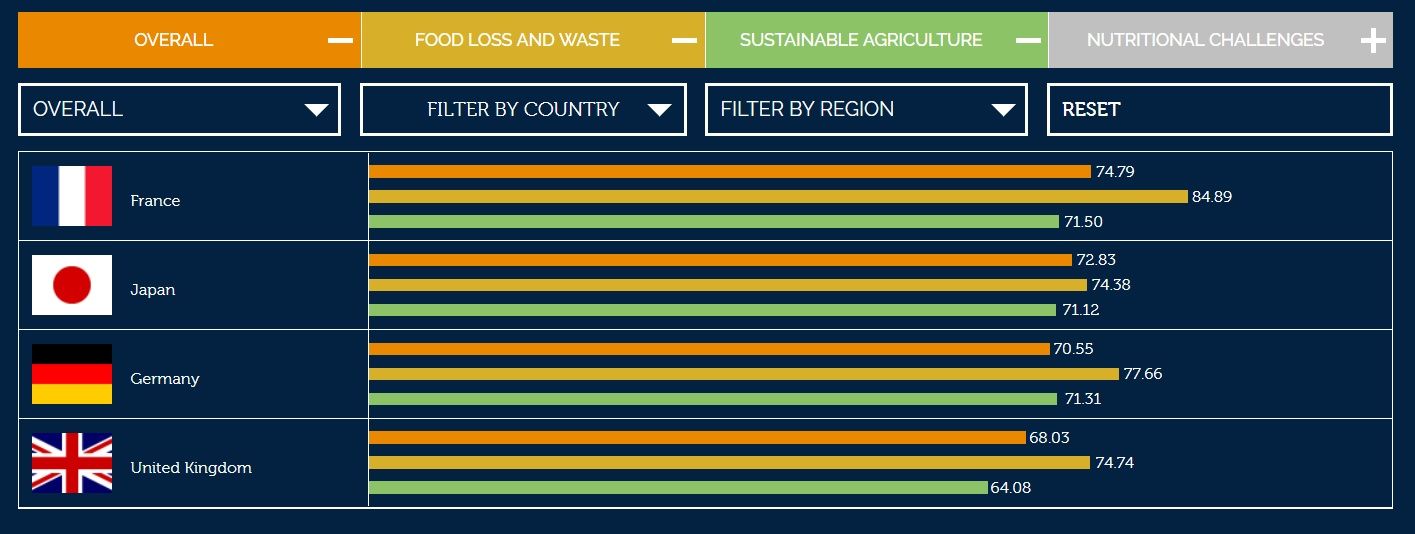
France has topped a list which ranks 34 countries according to their food system sustainability, with the UK coming tenth.
France remains in first place in the 2017 edition of the Food Sustainability Index (FSI), followed by Japan and Germany, with good performance across the three pillars of food loss and waste, sustainable agriculture and nutritional challenges.
Although richer countries tend to perform well in the FSI, high-income UAE ranks last, while low-income Ethiopia ranks a respectable 12th.
The US languishes in 21st place, due to low scores for sustainable agriculture and nutritional challenges.
These countries represent over 85% of global GDP and two-thirds of the global population. The FSI was developed by The Economist Intelligence Unit with the Barilla Center for Food & Nutrition Foundation (BCFN).
It offers a tool to understand and monitor performance and progress of individual countries, and the main challenges confronting the global food system.
The two organisations say that food sustainability is about "culture, education, health, equity and respect for the planet".
Strong on food waste
Repeating its success from 2016, France remains at the top, thanks to high scores across the FSI's three pillars.

Its performance is particularly strong in the food loss and waste category. In a world where a third of all food produced globally is either lost or discarded, according to estimates from the UN's Food and Agriculture Organisation, France has been in the vanguard of policies and measures to reduce such losses.
Top-performing countries in the FSI also include Japan, Germany, Spain, Sweden, Portugal, Italy, South Korea and Hungary.
These countries typically demonstrate strong and effectively implemented government policy on food waste and loss, environmental conservation in agricultural practices, innovations in agriculture, and nutrition education.
Poor for air and land
The UK ranks the top of the second quartile of top performing countries, coming tenth behind Hungary which ranks ninth.
The UK performed strongly in food loss and waste, with consistently high scores across the relevant indicators—including policy response to food loss and policy response to food waste—belied only by the solutions to distribution-level loss indicator.
However, the UK’s score in the sustainable agriculture pillar was middling. Despite a very strong showing in the water resources category, it was let down by poor scores for key indicators in the land category, which includes agricultural subsidies, diversification of the agricultural system and land-users.
It also has poor scores in the air category, particularly on climate change migration.
Similarly, the country earned an average score for the nutritional challenges pillar, as strong life quality indicators were dragged down by poorer scores within the life expectancy and dietary patterns categories, particularly on the prevalence of over-nourishment and number of people per fast food restaurant indicators.
Scarcity of water
Although high-income countries tend to perform well in the FSI, there are several outliers. Despite having the highest GDP per head, the UAE ranks last, while Ethiopia, the poorest country in the FSI, ranks a respectable 12th.
In common with other countries in the Arab world, the UAE has a high level of food waste, rising levels of obesity and receives a low score for sustainable agriculture, reflecting a scarcity of water and subsequent reliance on depleting aquifers and expensive desalination plants.
Meanwhile, the US languishes in 21st place in the overall FSI. The country achieves only a dismal 31st place in sustainable agriculture.
In terms of nutritional challenges, the US ranks 24th, dragged down by elevated levels of consumption of meat and saturated fat. Moreover, the sugar content of diets in the US is the highest among the 34 countries in our study.
'Ending hunger'
Martin Koehring, managing editor at The Economist Intelligence Unit, said sustainable food systems are "vital" in achieving the UN's 17 Sustainable Development Goals.
He said such systems are used for “ending hunger, achieving food security and improved nutrition, and promoting sustainable agriculture by 2030.
“However, major global developments such as climate change, rapid urbanisation, tourism, migration flows and the shift towards Westernised diets put food systems under pressure.
“The Food Sustainability Index is an important tool to help policymakers and other relevant stakeholders to design effective policies to improve food system sustainability.”
